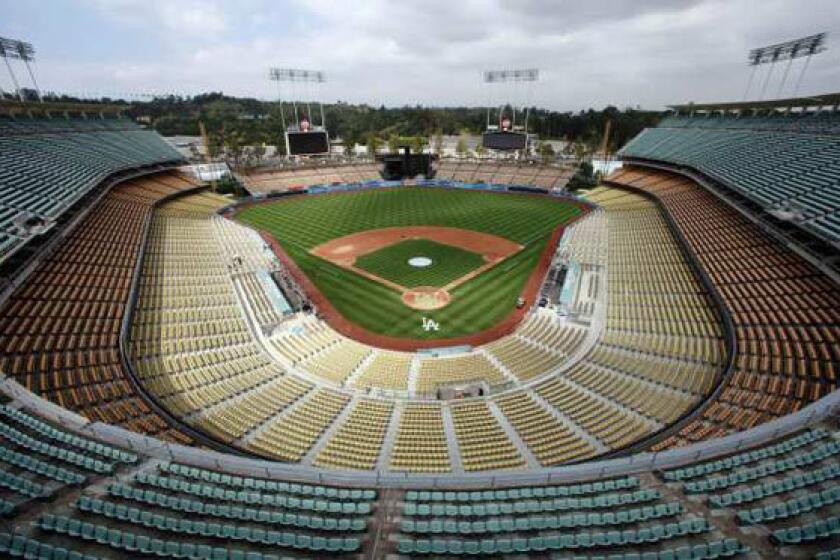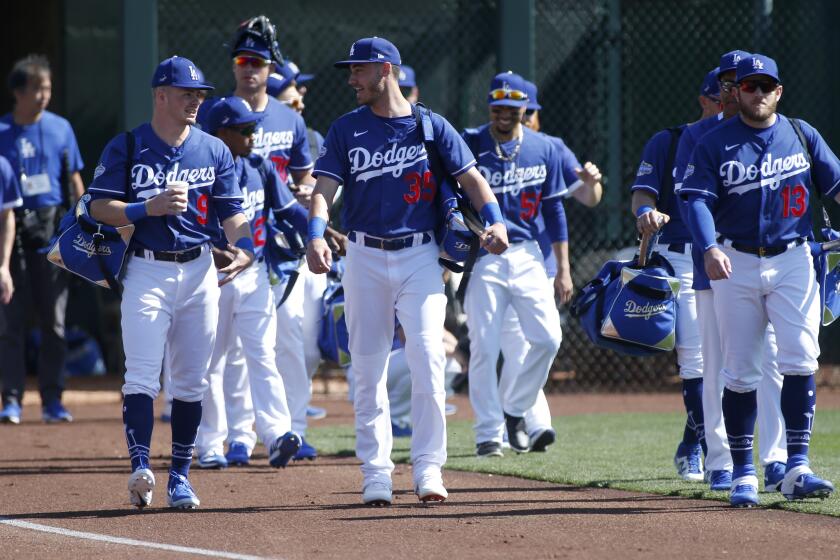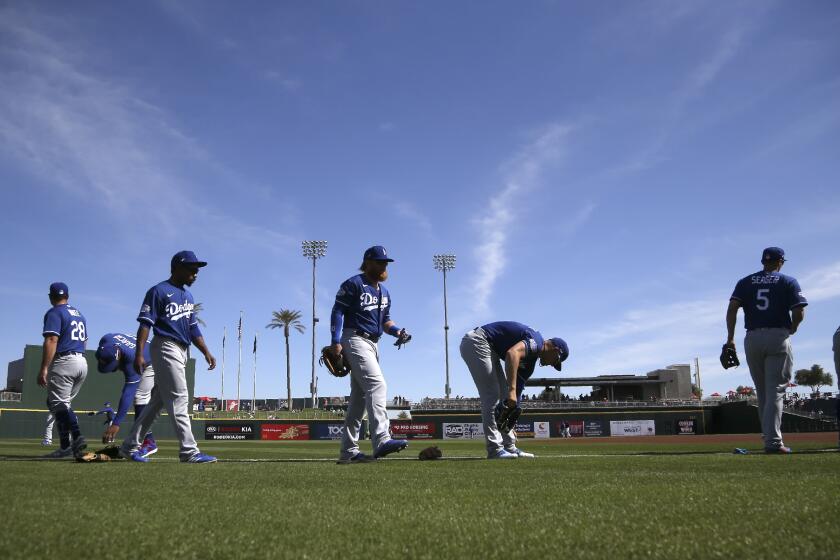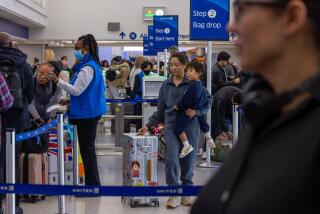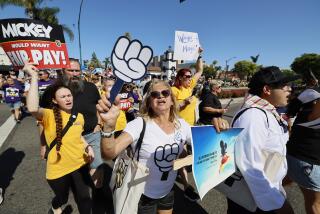Stadium workers’ union asks L.A. pro teams to pay wages, benefits during shutdown
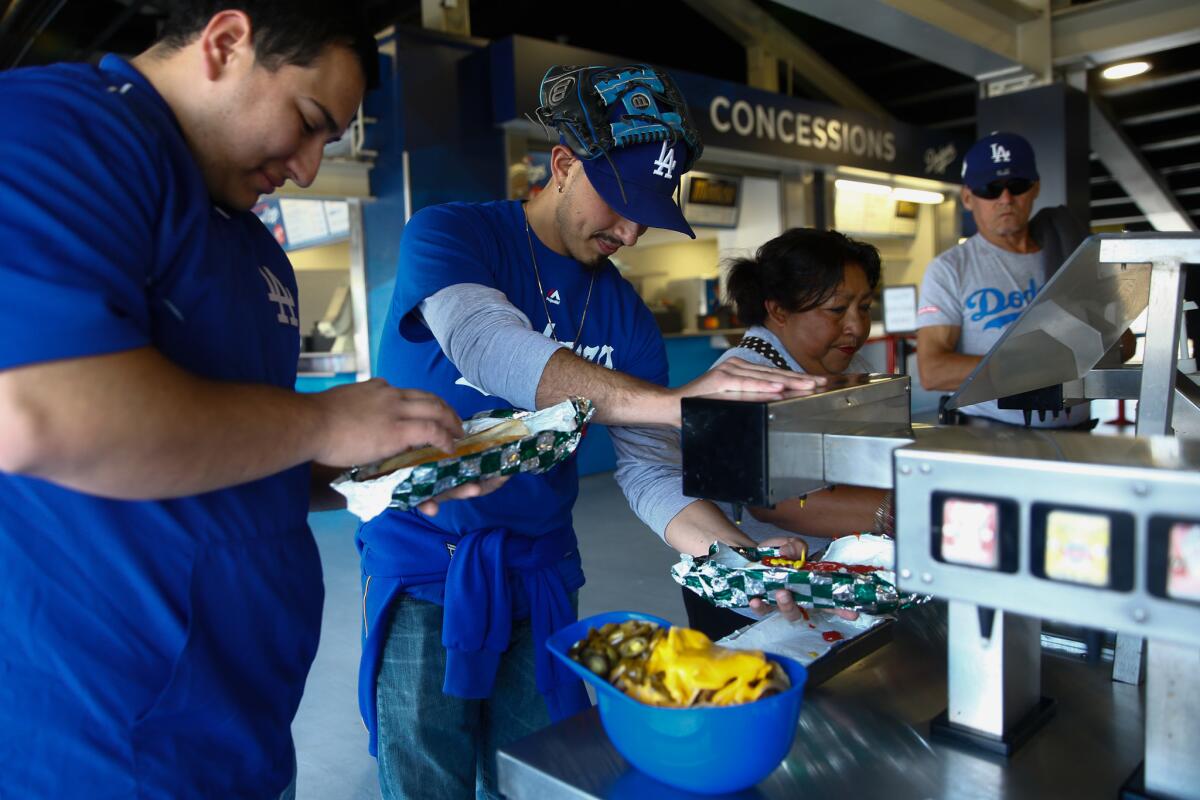
- Share via
Sylvia Sosa measures her time working at Dodger Stadium by the stars. She is a bartender now, but she started at a humble concession stand.
“Taking care of the mustard, relish, ketchup and nachos,” she said, “during the Fernando years.”
She has worked at the ballpark for 45 years. She is retired from her full-time job, so the money from her Dodger Stadium job is important. The health insurance is critical. And, as of Thursday, she has no idea when she might work there again.
“It kind of gets into panic mode,” Sosa said.
After an unprecedented 24-hour period in which the NBA, NHL, Major League Baseball and Major League Soccer put their seasons on hold because of the coronavirus pandemic, the men and women whose livelihood depends on selling hot dogs and drinks at those games suddenly face at an indefinite layoff.
Major League Baseball announced that spring training would be suspended because of the coronavirus pandemic. Starting the regular season on time is questionable.
The union that represents more than 5,600 game-day workers at five local venues has an idea for the owners of the eight pro teams that play there.
“We’re hoping they follow the lead of Mark Cuban,” said Susan Minato, co-president of Unite Here Local 11.
Cuban, the owner of the NBA’s Dallas Mavericks, told reporters Wednesday that he would try to offer financial support to his team’s game-day employees.
“They get paid by the hour, and this was their source of income,” Cuban said. “So, we’ll do some things there. We may ask them to go do some volunteer work in exchange, but we’ve already started the process of having a program in place. I don’t have any details to give, but it’s certainly something that’s important to me.”
On Thursday, the union sent a letter to the owners of the Lakers, Clippers, Sparks, Dodgers, Angels, Kings, Galaxy, and LAFC, asking them to maintain wages and healthcare benefits for the suddenly jobless employees.
Kelly Cheeseman, the chief operating officer of AEG, the operator of Staples Center and parent company of the Kings, said measures to soften the blow for arena employees are under discussion.
The Dodgers and Angels curtail travel of scouts in what typically is a busy time of year evaluating college and high school prospects.
“I can tell you that conversation is happening not only locally,” he said, “but I think across the nation at this point.”
AEG was working with the Lakers and Clippers on Friday to finalize a relief plan for arena workers.
The union does not represent workers at Honda Center, where the Ducks play. Henry and Susan Samueli, who own the Ducks and operate the city-owned arena, will pay all full-time and part-time employees who had been scheduled to work during the eight events that were called off through the end of March: three Ducks games, three Big West Conference tournament days, and two concerts.
Minato said workers at Dodger Stadium and Staples Center typically make from $18 to $22 an hour. Adelaide Avila said she works 36-40 hours a week as a cashier at Staples Center, with the job providing her sole income. She commutes from Palmdale and, of course, her rent is due April 1, before games are likely to resume.
“It puts a lot of people out of work,” Avila said.
On Thursday, Atlanta Hawks owner Tony Ressler said he would follow Cuban’s lead.
Cleveland Cavaliers forward Kevin Love said he had committed $100,000 to the team’s arena and support staff. The Cavaliers later announced they would compensate those workers “as if every game and every event is still taking place.”
Minato said Disney had agreed to pay Disneyland workers through March 28, even as the theme park closes this week. She said she sympathized with companies struggling to plan for closures that could last for weeks, or for months.
“It’s really important that people are thinking out of the box,” she said. “This can peter out, or this can be a tragedy beyond words. We don’t know.”
That said, collective bargaining is all about give and take, and what would the union have to offer in exchange for asking teams to pay game-day workers at a time there is no game-day income?
“Image, and how they project in the community, is huge,” Minato said. “If a company is going to work with us, and make sure workers don’t fall through the cracks and join the 50,000 people on the streets right now, then we’re going to push their positive image as far as we can take that.”
With spring training and the first two weeks of the regular season canceled because of the coronavirus pandemic, the Dodgers plan to continue to prepare.
More to Read
Go beyond the scoreboard
Get the latest on L.A.'s teams in the daily Sports Report newsletter.
You may occasionally receive promotional content from the Los Angeles Times.

